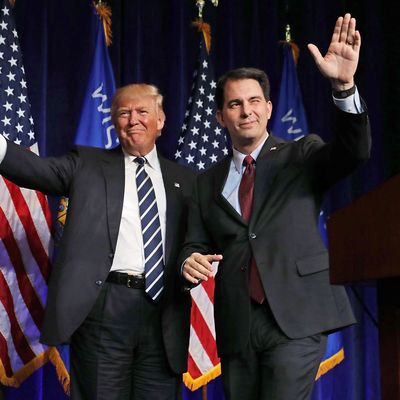
One of the grand ironies of Donald Trump’s elevation to the presidency is that this self-proclaimed champion of the (white) working class is poised to become the most anti-labor chief executive in U.S. history. His victories in the old labor strongholds of Ohio, Pennsylvania, Wisconsin, and (apparently) Michigan were shocking enough — as was his relatively strong performance nationally in union households (Clinton won them by 8 percent, down from Obama’s 2012 margin of 18 percent).
Aside from Trump’s pledge to renegotiate NAFTA and other trade agreements, there’s really nothing in his history or his campaign platform to please the labor movement. Yes, he has boasted of getting along with union people in running his hotels and other businesses, but that does not really separate him from any other employer operating in places like New York. He has very specifically endorsed “right-to-work” laws that keep unions from receiving membership dues from all employees in a shop where they are the recognized collective-bargaining agent. More tangibly, his massively pre-vetted list of potential replacements for Justice Antonin Scalia and a Republican Senate prepared to confirm a right-wing justice will virtually guarantee a fifth vote making the collection of representation fees from non-members benefiting from public employee union contracts unconstitutional once the Friedrichs v. CTA case (which generated a 4-4 tie the last time SCOTUS heard it) makes its way back to the High Court. That encouragement of “free riders” will be a terrible, terrible blow to public employee unions, by far the most vibrant segment of the labor movement.
Another likely opportunity for Trump to quickly screw over workers will be as part of his pledge to reverse all of Barack Obama’s executive orders on day one of his presidency. That will include Obama’s imposition of a higher minimum wage and paid sick leave for the employees of federal contractors. An even bigger pro-labor Obama administrative initiative that will be the target for business lobbies and vengeful anti-union Republicans are the new, expansive overtime regulations promulgated by the Labor Department earlier this year.
But some of the most important administrative rulings on labor law come from the National Labor Relations Board, including a 2015 decision that would make large companies operating through franchises responsible for the working conditions of franchise employees (a huge issue with the fast-food industry). There are currently two vacancies on the five-member board; if Trump moves quickly to fill them with appointees congenial to the Republican Senate, a case could pretty rapidly be found to overturn that rule, to the great joy of prominent Trump supporters like Andy Puzder, CEO of the company that runs the Carl’s Jr. and Hardee’s fast-food chains.
So the greatest direct damage Trump can wreak on unions and worker protections will be lurking behind much more dramatic and high-profile reversals of Obama executive orders in areas like immigration and energy. Most of his anti-labor actions will come indirectly, through his appointees to the Supreme Court, the NLRB, and the Labor Department.
It’s the cabinet appointment to head the Labor Department that will provide Trump’s first opportunity to send a signal about his actual intentions toward the working stiffs who helped him get elected. The above-mentioned fast-food baron Puzder is one possibility. A lower-profile option (who would also help with the Trump cabinet’s likely resemblance to a men’s locker room) is long-time EEOC member Victoria Lipnic, who as a George W. Bush administration functionary helped write a much more restrictive overtime rule than the one just issued by Obama’s Labor Department. But there’s a high-profile option, too: Governor Scott Walker of Wisconsin. This would represent an unmistakable insult and threat to the labor movement, and would also go miles to assuage big business and conservative ideological fears about Trump. Walker is reportedly not very interested in giving up the last two years of his hard-won gubernatorial term to move to Washington. But perhaps Trump’s chief-of-staff designee, Reince Priebus, will convince his old Wisconsin partner that the opportunity for massive, nationwide vengeance against the labor enemies he earned in Madison is too good to pass up.
All of these baleful possibilities for labor policy are aside from the Trump administration’s more general plans that represent everything the current labor movement abhors, from a nasty anti-immigrant posture to the repeal of the Affordable Care Act to (probably) the enactment of some version of the Ryan budget, with its savage treatment of the social safety net. But at least working folks will have a president who loves to pose for photos with working-class folks even as he is letting their biggest enemies run the country.






























